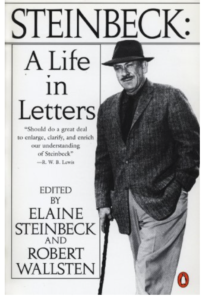
Steinbeck: A Life in Letters
Edited by Elaine Steinbeck and Robert Wallsten
Paperback, 928 pages
Published April 1, 1989 by Penguin Books
John Steinbeck was an important writer and an interesting character. As noted on Amazon, he hated the telephone. So for him, “letter-writing was a preparation for work and a natural way for him to communicate his thoughts on people he liked and hated; on marriage, women, and children; on the condition of the world; and on his progress in learning his craft.”
I’ve been reading this collection of his letters, prompted by a review in “Brainpickings,” and I’m enjoying it. It opens with letters written during his early years in California, and closes with a 1968 note written in Sag Harbor, NY.
Here’s an excerpt from the book (selected by “Brainpickings”) on the topic of human nature:
“Speaking of the happy new year, I wonder if any year ever had less chance of being happy. It’s as though the whole race were indulging in a kind of species introversion – as though we looked inward on our neuroses. And the thing we see isn’t very pretty…. So we go into this happy new year, knowing that our species has learned nothing, can, as a race, learn nothing – that the experience of ten thousand years has made no impression on the instincts of the million years that preceded.”
Another excerpt:
“Not that I have lost any hope. All the goodness and the heroisms will rise up again, then be cut down again and rise up. It isn’t that the evil thing wins – it never will – but that it doesn’t die. I don’t know why we should expect it to. It seems fairly obvious that two sides of a mirror are required before one has a mirror, that two forces are necessary in man before he is man. I asked [the influential microbiologist] Paul de Kruif once if he would like to cure all disease and he said yes. Then I suggested that the man he loved and wanted to cure was a product of all his filth and disease and meanness, his hunger and cruelty. Cure those and you would have not man but an entirely new species you wouldn’t recognize and probably wouldn’t like.”
From The New York Times: “Surely his most interesting, plausibly his most memorable, and… arguably his best book.”
From Los Angeles Herald-Examiner: “The reader will discover as much about the making of a writer and the creative process as he will about Steinbeck. And that’s a lot.”
